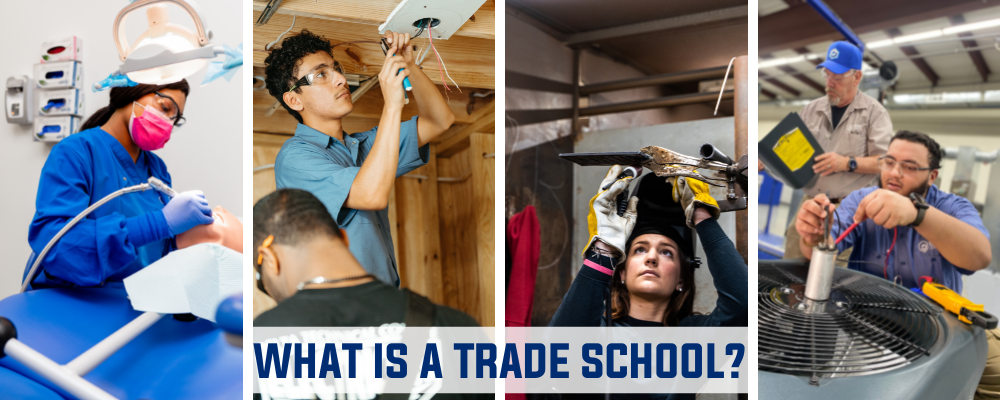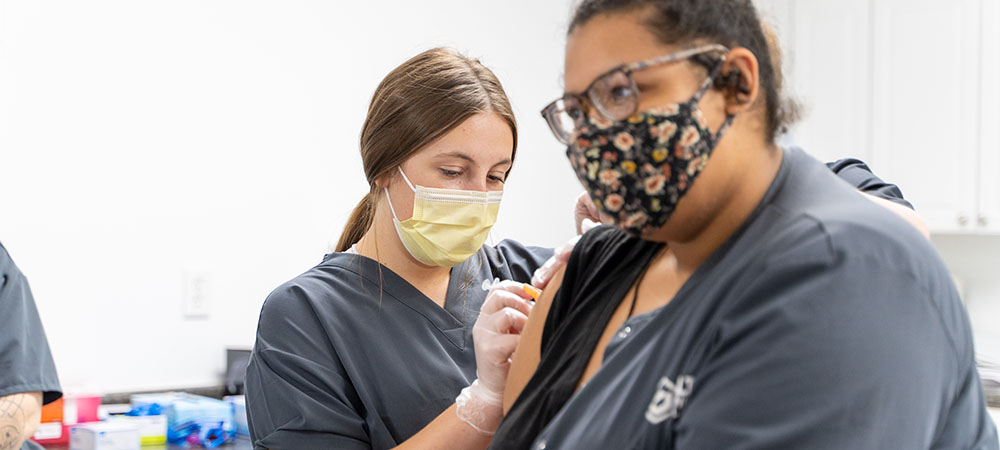If you’ve been researching options for your path after high school, or you’re interested in going back to school to learn a new skill, you’ve likely heard of trade school—but what exactly is it? And how do you know if it’s the right option for you?
Trade School Definition
A trade school (also known as a technical school) is a postsecondary educational institution designed to train students for a specific job in a skilled trade career. Most importantly, a trade school offers hands-on training to prepare students for actual work in their chosen field. Trade school programs are concentrated entirely on relevant job training, which is different from 2-year or 4-year colleges that typically require general education courses, such as English or Biology.
For example, if you’re interested in becoming a welder but you’ve never welded before, where can you learn how to weld? A welding trade school provides an environment where you can practice in a setting that prepares you for the job. At MTI’s trade schools in Illinois, welding students get hands-on training in weld shops that simulate real working environments.
What Are the Types of Trade School Programs?
A trade school offers highly-focused training programs specifically designed to prepare students for a job in the skilled trades. Trade schools focus on developing students’ technical abilities in skilled trades, mechanical trades, allied health.
Many trade schools offer several different types of training programs at one campus. For example Midwest Technical Institute (MTI) offers programs in mechanical trades, allied health, cosmetology, and truck driving training. Not all programs are available at all MTI campuses, however all MTI campuses offer a mix of several different skilled trades training programs at the same location.
Some trade schools are highly specialized and offer different variations of training in only one field. For example, an automotive technical school is focused around car mechanics, and might offer different programs with different specializations.
To learn more about MTI’s trade school near you, schedule a tour!
Skilled Trades
“Skilled” means that special skills need to be developed in order to do the job—not just anyone can do it. A trade school gives students the knowledge needed in order to start a career in a field that requires technical expertise and hands-on experience. In some cases, the job may require certifications or licensing.
Cosmetology is considered a skilled trade, because it requires specific training and licensing, which may vary by state. Similarly, truck driving requires specific training and licensing by state, and is therefore considered a skilled trade.
Learn more:
- How Can I Get My CDL in Illinois?
- How Can I Get My CDL in Missouri?
- Why is Cosmetology Considered a Trade?

*Source: U.S. Bureau of Labor Statistics 2020-2030
Mechanical Trades
Mechanical trades work generally involves building, maintaining, operating, or fixing some sort of mechanical system. Think of a blacksmith, a welder, a construction worker, a car mechanic, a pipefitter, an electrician, or an HVAC technician. These are all skilled mechanical trades professionals.
MTI’s Missouri trade school and trade schools in Illinois offer several mechanical trades programs, including:
- HVAC/R Technician Program
- Welding Program
- Welding & Pipefitting Program (includes 10 additional weeks of pipefitting training)
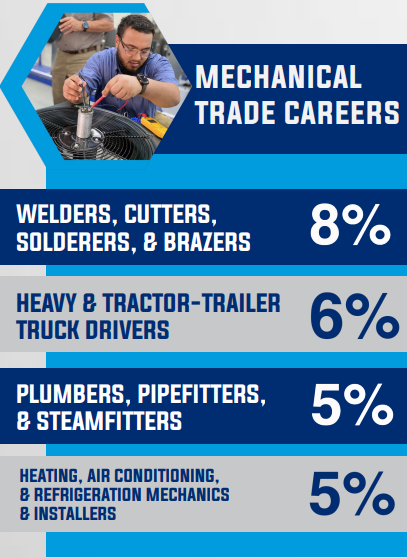
*Source: U.S. Bureau of Labor Statistics 2020-2030
Allied Health
The Association of Schools of Allied Health Professions (ASAHP) defines allied health professionals as a broad group of health professionals who support health care systems, including dental personnel (dental hygienists and dental assistants), exercise science professionals, health information technologists, and other healthcare providers and support personnel, such as medical assistants.
According to ASAHP, as much as 60% of the U.S. healthcare workforce may be classified as allied health.
MTI’s Missouri trade school and trade schools in Illinois offer several allied health training programs and courses, including:
- Medical Assisting Program
- Dental Assisting Program
- Basic Nursing Assistant (BNA) Course
- Phlebotomy Course
- Medical Coding Specialist Program
- Massage Therapy Program
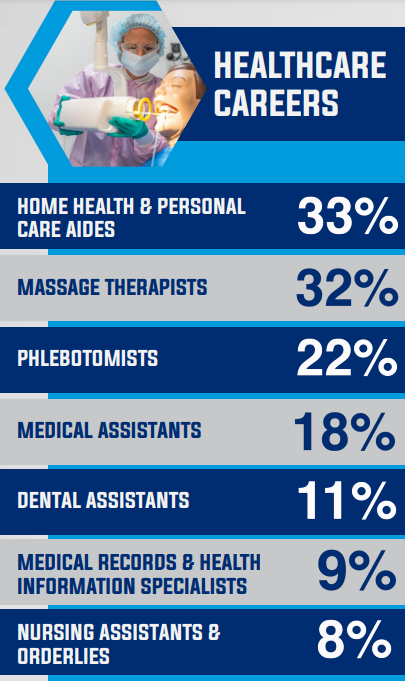
*Source: U.S. Bureau of Labor Statistics 2020-2030
Interested in Learning More About MTI?
Fill out the form below to receive info about our career training programs.
How Long Are Trade Schools?
Trade schools are highly focused on equipping students with the relevant skills they need to land the entry-level job they want. Unlike a four-year academic college, trade schools don’t require any classes or credits that aren’t entirely related to the job at hand.
Because the technical training is much more focused than other types of colleges, the lengths of the programs are usually much shorter, meaning less time spent completing your training, and a faster route towards the first paycheck.
Each program is unique, but generally speaking, a skilled trades training program can take anywhere from a few months to a year. Some more specialized types of training programs can last anywhere from one to two years. The length of schooling to gain entry-level technical skills is usually under one year. At MTI, most of our programs can be completed in less than a year.
In part, how long trade school takes is dependent on your educational background. Trade schools are considered postsecondary education, which means a high school diploma or GED is typically required. If you don’t have a high school diploma, it may take a little extra time to study for and pass the GED exam first before enrolling.
Many trade schools offer GED assistance or even free GED preparation. At MTI, we offer the Penn Foster Program for students interested in earning their high school diploma.
How Much Does Trade School Cost?
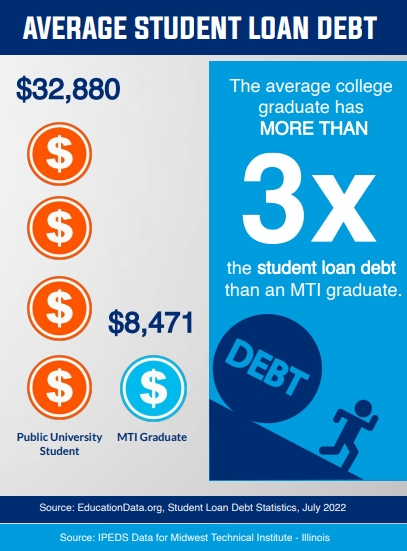
Different types of trade schools and training programs will have different costs that are unique to that program, location, and specialty.
Comparatively, trade school programs generally cost much less than a four-year college degree. According to EducationData.org, the average public university student borrows $32,880 to attain a bachelor’s degree. That is more than 3x the average student loan debt for an MTI graduate, according to Integrated Postsecondary Education Data System (IPEDS) data for MTI’s Springfield, Illinois campus.
How Do You Pay For Trade School?
Most trade schools offer some sort of scholarship opportunities, grants, or loans to help offset the cost of training. The cost of enrolling in a trade school should also be considered alongside the benefits of future earnings, including: expected salary upon completion, expected job growth in the field, expected number of years working, and future potential earnings with advanced specialization.
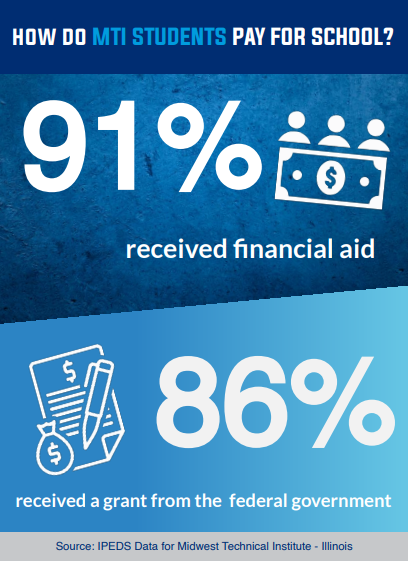
At MTI, all tuition (where applicable) includes:
- Fees
- Books
- Equipment
- Certification Tests
- Uniforms
MTI offers trade schools in Illinois and trade schools in Missouri. For more information about program costs at MTI, contact us!
Benefits of Trade School
If you’re looking to enter the skilled trades industry, a technical school can offer the practical training you need to start a new career.
Here’s a few things that MTI’s trade schools in Illinois and Missouri offer students:
- Hands-on training in labs that simulate real working environments
- Instructors with real-world experience in the field
- Smaller student-to-instructor ratio
- Flexible class schedules
- Financial aid and scholarship opportunities available to those who qualify
- 1:1 support from enrollment to graduation
- Professional & personal development resources
- Career placement assistance to all graduates who qualify
Start Your Path to a New Career at MTl
Trade schools are great for students who want to complete their studies quickly and start a new career as soon as possible! At MTI, we’re here to help you choose a new future and change your life.
Want to learn more about trade school and what you can learn at Midwest Technical Institute?
Fill out the form below to connect with MTI’s friendly Admissions Team! They can answer any questions you have and share next steps.
Sources
https://www.asahp.org/what-is/
https://collegecost.ed.gov/affordability
https://research.collegeboard.org/media/pdf/trends-college-pricing-student-aid-2021.pdf#page=18
https://apps.illinoisworknet.com/cis/TrainingPrograms/SchoolInformation/546064?mileage=10
